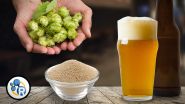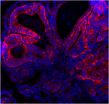INFORMATION:
Subscribe to the series at http://bit.ly/ACSReactions, and follow us on Twitter @ACSreactions to be the first to see our latest videos.
The American Chemical Society is a nonprofit organization chartered by the U.S. Congress. With more than 158,000 members, ACS is the world's largest scientific society and a global leader in providing access to chemistry-related research through its multiple databases, peer-reviewed journals and scientific conferences. Its main offices are in Washington, D.C., and Columbus, Ohio.
To automatically receive news releases from the American Chemical Society, contact newsroom@acs.org.
Follow us: Twitter Facebook
Craft beer chemistry (video)
2015-03-16
(Press-News.org) WASHINGTON, March 16, 2015 -- It's been around for centuries but it seems like beer has never been more popular. Microbreweries are cranking out special stouts, IPAs, lagers and pilsners. And the flavors and aromas of each of those brews all come down to chemistry. This week, in honor of St. Patrick's Day, Reactions takes on craft beer chemistry. Sip on the video here: https://youtu.be/vW99JEaDApY.
ELSE PRESS RELEASES FROM THIS DATE:
MDC cancer researchers identify new function in an old acquaintance
2015-03-16
Cells have two different programs to safeguard them from getting out of control and developing cancer. One of them is senescence (biological aging). It puts cancer cells into a permanent sleep so they no longer divide and grow in an uncontrolled way. Now the research group led by Professor Walter Birchmeier (Max Delbrück Center for Molecular Medicine, MDC, Berlin-Buch) has discovered that an enzyme known to be active in breast cancer and leukemia blocks this protection program and boosts tumor growth. They succeeded in blocking this enzyme in mice with breast cancer, ...
New system for detecting adverse effects of medications using social media
2015-03-16
This news release is available in Spanish.
The researchers explain that online health information searches are the third most popular activity in Google, with 170,000 searches performed every 5 seconds. Isabel Segura Bedmar of the UC3M Computer Science and Engineering Department points out that, "There is a lot of user-generated information these days, so social networks can be a valuable source of information on adverse effects of pharmaceutical drugs after the clinical trial stage is over and the drug is on the market." The large amount and variety of information ...
New remote control for molecular motors
2015-03-16
In the eyes of physicists, magnetic molecules can be considered as nanoscale magnets. Remotely controlling the direction in which they rotate, like spinning tops, may intuitively be difficult to achieve. However, Russian physicists have just demonstrated that it is theoretically possible to do so. They have shown that a change of direction in the circular polarisation of an external magnetic field leads to a change in the direction of the mechanical rotation of the molecule. These findings by Iosif Davidovich Tokman and Vera Il'inichna Pozdnyakova from the Institute for ...
Study of veterans finds family support during deployment reduces suicidal thoughts
2015-03-16
(Boston)--Family support during deployment is an important protective factor against post-deployment suicidal ideation according to a new study in the journal Anxiety, Stress and Coping.
Suicidal ideation includes thoughts that can range from fleeting consideration of suicide to the development of a specific plan for killing oneself. Research on suicidal ideation in veterans who served in support of Operation Enduring Freedom (OEF) in Afghanistan and Operation Iraqi Freedom (OIF) in Iraq has revealed a number of important predictors of suicidal ideation, including potentially ...
How Millennials get their news
2015-03-16
Millennials are anything but "newsless," passive, or uninterested in civic issues, according to a new comprehensive study of the information habits of people age 18-34. The research looks closely at how members of the Millennial generation learn about the world on different devices and platforms.
The study finds that Millennials consume news and information in strikingly different ways than did previous generations. Contrary to popular perception, they keep up with news that is commonly referred to as "traditional" or "hard," as well as stories that connect them to hobbies, ...
A breakfast of champions for diabetics
2015-03-16
Our modern epidemic of obesity has led to an alarming rise in the incidence of diabetes. More than 382 million people on the planet suffer from diabetes, predominantly type-2 diabetes. For these people, blood sugar surges -- glucose spikes after meals -- can be life threatening, leading to cardiovascular complications.
A new Tel Aviv University study published in Diabetologia proposes a new way to suppress deadly glucose surges throughout the day -- eating a high-caloric breakfast and a more modest dinner. According to TAU's Prof. Daniela Jakubowicz and Dr. Julio Wainstein ...
Label design may affect risk of medication errors in OR, reports Journal of Patient Safety
2015-03-16
March 16, 2015- Special redesigned labels for intravenous (IV) medication bags may help to prevent serious medication errors in the operating room, reports a study in the March issue of the Journal of Patient Safety. The journal is published by Wolters Kluwer.
Based on trainee behaviors during OR simulations, "The results of this study provide additional evidence to support the use of opaque, white medication labels and the use of inverted text for highlighting key medication information on the label," writes Jamie L. Estock, MA, of the VA Pittsburgh Healthcare System ...
Mental health misdiagnosis twice more likely for socially disadvantaged groups
2015-03-16
March 16, 2015 - The shooting of an unarmed teenager in Ferguson, MO, has ignited a global discussion about implicit racial bias. One group of people you might think would be immune from this hidden bias is clinical therapists, people trained to understand the human mind. But a new field study finds that the social identities of patients and their therapists affect the accuracy of the diagnosis: Therapists were twice as likely to misdiagnose mental illness when their patients were members of a disadvantaged, compared to an advantaged, group.
In her own practice, Ora Nakash, ...
Genetics: No evidence of role in racial mortality gap
2015-03-16
There is still no evidence of genetic difference between blacks and whites to account for the health disparities in cardiovascular disease (CVD), according to a new study by McGill University researchers. Published in the American Journal of Epidemiology, the researchers suggest that after a decade of genetic studies, factors such as lifestyle, education and socio-economics - not genetics - are more promising avenues to understanding racial health disparities.
The researchers focused on cardiovascular disease, the largest contributor to the racial mortality gap, and ...
Penn vet team points to new colon cancer culprit
2015-03-16
Colon cancer is a heavily studied disease -- and for good reason. It is one of the leading causes of cancer-related deaths worldwide, and its numbers are on the rise, from 500,00 deaths in 1990 to 700,000 in 2010.
This growth comes despite scientists' ever-increasing knowledge of the genetic mutations that initiate and drive this disease. Now, a team of researchers from the University of Pennsylvania has found evidence of a new culprit in the disease, a protein called MSI2.
Their findings provide a new target for potential therapeutic intervention in colorectal cancer ...


